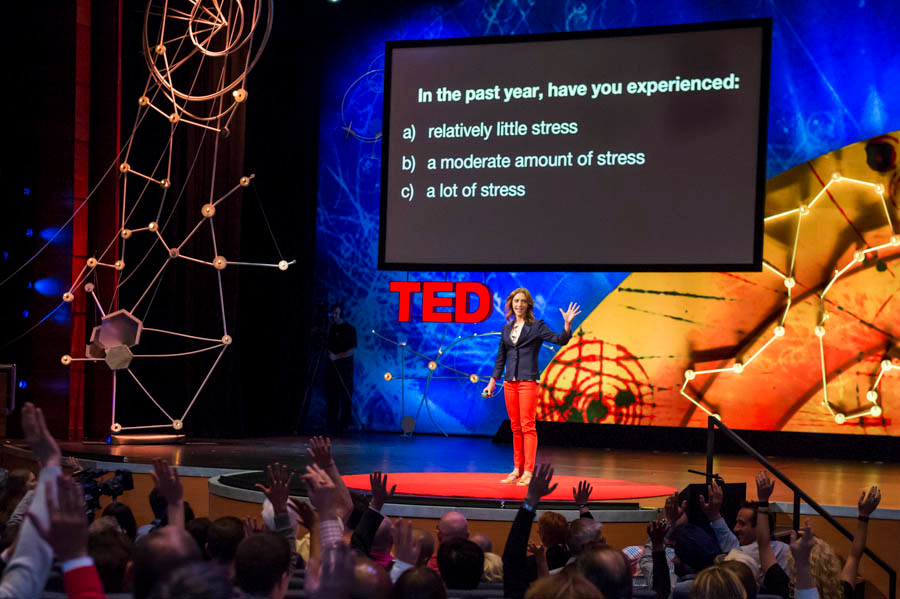スタンフォード大学で教鞭を執る健康心理学者のケリー・マクゴニガル(Kelly McGonigal)のスピーチの英語を徹底解説する。日本語訳なしでも理解できるよう、単語と文法をわかりやすくご説明する。日本語訳を読んだだけではわからない、ケリーの真の言葉を感じて欲しい。
スピーチの題名は「How to make stress your friend」(ストレスを友達にする方法)。2013年6月にTEDで収録されたものだ。ケリーは、ストレスは捉え方により健康に害は全くないと主張している。ストレスに押し潰れそうなビジネスパーソンの皆さまにお勧めだ。
なお、このスピーチはトータルで12分ある。全て一つのコラムにアップすると重くなるので3つのコラムに分けてある。このコラムは2つ目だ。1つ目は「ケリー・マクゴニガルの英語①|ストレスは友達!TEDスピーチを徹底解説」で楽しんで頂きたい。
Now that you’re sufficiently demoralized, time for part two: a math test. And unbeknownst to you, the experimenter has been trained to harass you during it. Now we’re going to all do this together. It’s going to be fun. For me. Okay. I want you all to count backwards from 996 in increments of seven. You’re going to do this out loud, as fast as you can, starting with 996. Go!
(Audience counting)
Go faster. Faster please. You’re going too slow.
(Audience counting)
Stop. Stop, stop, stop. That guy made a mistake. We are going to have to start all over again.
Now that 〜: 今や~だから
demoralized /dimɔ́(ː)rəlàizd/ (形) 士気阻喪した
unbeknownst to 〜: ~の知らないうちに
experimenter /ikspérəmèntər/ (名) 実験者
harass /hərǽs/ (動) 嫌がらせをする
count backwards: 逆に数える
increment /ínkrəmənt/ (名) 増加 (量) ⇨ “in increments of 〜”「~きざみで」。
out loud: 大きな声で、はっきりと
all over again: 最初からやり直して
You’re not very good at this, are you? Okay, so you get the idea. If you were actually in this study, you’d probably be a little stressed out. Your heart might be pounding, you might be breathing faster, maybe breaking out into a sweat. And normally, we interpret these physical changes as anxiety or signs that we aren’t coping very well with the pressure.
if you were 〜, you’d probably be 〜: 仮定法過去で、現在の事実とは異なることを仮定。「あなたが〜であるならば、あなたは〜かもしれない。」のニュアンス。
pound /páund/ (動)(心臓が)激しく高鳴る
break out into a sweat: 突然汗が噴き出る
interpret /intə́ːrprət/ (動) 解釈する
anxiety /æŋzáiəti/ (名) 心配
cope /strés/ (動) うまく処理/対処する ⇨ “cope with 〜” 「〜をうまく処理する」
But what if you viewed them instead as signs that your body was energized, was preparing you to meet this challenge? Now that is exactly what participants were told in a study conducted at Harvard University. Before they went through the social stress test, they were taught to rethink their stress response as helpful. That pounding heart is preparing you for action. If you’re breathing faster, it’s no problem. It’s getting more oxygen to your brain. And participants who learned to view the stress response as helpful for their performance, well, they were less stressed out, less anxious, more confident, but the most fascinating finding to me was how their physical stress response changed.
what if 〜: もし~だったらどうなるか
view 〜 as …: ~を…と見なす/考える
instead /instéd/ (副) 代わりに
signs that 〜: “that” は関係代名詞で先行詞は “signs”。
energized /énərdʒàizd/ (形) エネルギーを得ている
was preparing: 主語は “your body”
meet a challenge: 難問に対処する
what participants were told: “what” は先行詞を含む関係代名詞で「“participants” が言われたこと」の意。
a study (that) conducted at 〜: カッコ内の関係代名詞が省略されている。 「〜で行われた “study”」
rethink 〜 as …: 〜を…として考え直す
stress response: ストレス反応
oxygen /ɑ́ksidʒən/ (名) 酸素
participants who learned to view the stress response as helpful for their performance: 名詞句で、この後の “they” と同格。
how their physical stress response changed: “how” は疑問詞で間接疑問文。「体のストレス反応がどの様に変化したか」の意。
Now, in a typical stress response, your heart rate goes up, and your blood vessels constrict like this. And this is one of the reasons that chronic stress is sometimes associated with cardiovascular disease. It’s not really healthy to be in this state all the time. But in the study, when participants viewed their stress response as helpful, their blood vessels stayed relaxed like this. Their heart was still pounding, but this is a much healthier cardiovascular profile. It actually looks a lot like what happens in moments of joy and courage. Over a lifetime of stressful experiences, this one biological change could be the difference between a stress-induced heart attack at age 50 and living well into your 90s. And this is really what the new science of stress reveals, that how you think about stress matters.
blood vessel: 血管
constrict /kənstríkt/ (動) 収縮する
chronic /strés/ (形) 慢性の ⇨ “chronic stress” 「慢性ストレス」
associated with 〜: ~と関係がある
state /stéit/ (名) 状態 ⇨ “in this state” 「この様な状態になる」
stay relaxed: くつろいでいる
profile /próufail/ (名) 特徴
It (actually) looks (a lot) like 〜: カッコ内は2つとも副詞。 “it” は “a much healthier cardiovascular profile” を指す。「それは実際には、〜にかなり似ている」の意。
what happens in moments of joy and courage: “what” は先行しを含む関係代名詞で「〜のこと/もの」の意。“in moments of 〜” は「〜の時」。全体では「“joy and courage” の時に起こること。」のニュアンス。
courage /kə́ːridʒ/ (名) 勇気
over a lifetime of 〜: 生涯にわたる〜で
this one biological change: 「この一つの生物学的変化」の意で、ここでは、“cardiovascular profile” が変化を指す。
stress-induced: ストレス誘導(性)の
could be the difference between 〜 and …: “could” は「〜のこともありえる」のニュアンス。全体では「〜と…の違いになりうる。」の意。
reveal /rivíːl/ (動) 明らかにする
that how you think about stress matters: “that” 以下で “reveal” したことを説明している。 “how you think about stress” が “that” 節内の主語で「ストレスについての考え方」のニュアンス。 “matters” は、動詞で「重要である」の意。
So my goal as a health psychologist has changed. I no longer want to get rid of your stress. I want to make you better at stress. And we just did a little intervention. If you raised your hand and said you’d had a lot of stress in the last year, we could have saved your life, because hopefully the next time your heart is pounding from stress, you’re going to remember this talk and you’re going to think to yourself, this is my body helping me rise to this challenge. And when you view stress in that way, your body believes you, and your becomes healthier.
no longer: もはや~でない
get rid of 〜: ~を取り除く
make 〜 better: ~を改善する
at stress: ストレス状態の時
intervention /ìntərvénʃən/ (名) 介入
(if) you had had a lot of stress in the last year, we could have saved your life: 仮定法過去完了で「もし〜していたら、…していたであろう。」の意。
think to oneself: ひそかに考える
this is my body helping me 〜: 「これは “my body” が、私が〜することを助けているのだ。」のニュアンス。
rise to the challenge: 困難にうまく対処する
Now I said I have over a decade of demonizing stress to redeem myself from, so we are going to do one more intervention. I want to tell you about one of the most under-appreciated aspects of the stress response, and the idea is this: Stress makes you social.
a decade of 〜: 10年にわたる~
demonize /dímənàiz/ (動) 悪者扱いする
redeem /ridíːm/ (動)(名誉を)挽回する ⇨ “redeem oneself” 「名誉を回復する」“from” の後は “a decade of demonizing” が隠れている。
I have over a decade of demonizing stress to redeem myself from.: 「私は、私の名誉を挽回すべき、ストレスを悪者扱いした10年間以上を持っている。」から「私は10年以上ストレスを悪者扱いしてきたが、名誉を挽回しなければならない。」のニュアンス。
appreciated /əpríʃièitid/ (形) 評価された ⇨ “under-appreciated” 「(価値が)正しく評価されていない」の意。
aspect /ǽspekt/ (名) 側面
social /sóuʃəl/ (形) 社交的な
Stress makes you social: “make” は使役動詞で「ストレスはあなたを “social” にする」の意。
To understand this side of stress, we need to talk about a hormone, oxytocin, and I know oxytocin has already gotten as much hype as a hormone can get. It even has its own cute nickname, the cuddle hormone, because it’s released when you hug someone. But this is a very small part of what oxytocin is involved in.
hormone /hɔ́ːrmoun/ (名)(生化学)ホルモン
oxytocin /ɑ̀ksitóusn/ (名) オキシトシン(子宮収縮ホルモン)
has gotten: = has
hype /háip/ (名) 誇大広告
oxytocin has already gotten as much hype as a hormone can get: 「オキシトシンは、ホルモンが得ることができる多くの誇大広告を既に持っていた。」つまり「オキシトシンは、既にどのホルモンより多くの注目を集めている。」のニュアンス。
cuddle /kʌ́dl/ (名) 抱擁
release /dímənàiz/ (動) 放出する
hug /hʌ́g/ (名) 抱擁
what oxytocin is involved in: “what” は先行詞を含む関係代名詞で「オキトシンが関係していること」の意。
つづきは「ケリー・マクゴニガルの英語③|ストレスは友達!TEDスピーチを徹底解説で楽しんで頂きたい。

『英語独学完全マニュアル』
独学で効率的に習得する科学的学習法の全て(全79ページ)
英語は独学が基本です。しかし、「自分の学習方法が正しいかどうか…」不安に思っていませんか?本書は、英語の学習方法についてお悩みの皆さまに、第二言語習得研究と脳科学(神経科学)研究の知見に基づいた真に効率的な英語学習法をご紹介する解説書です。
無料eBookの主な内容
- 単語・文法・発音の効率的な基礎力強化方法
- インプット(読む・聞く)能力向上のための英語脳作りトレーニング法
- アウトプット(話す・書く)能力向上のためのリハーサル・トレーニング法
- 学習計画の立て方と効率性を上げるための学習習慣
そろそろ本気で英語を習得したいとお考えの方におすすめです。また、「英会話スクールに通っているけど思うように上達しない…」「TOEICで高得点を取ったけど話せない…」などでお悩みの皆さまも是非ご一読ください。



